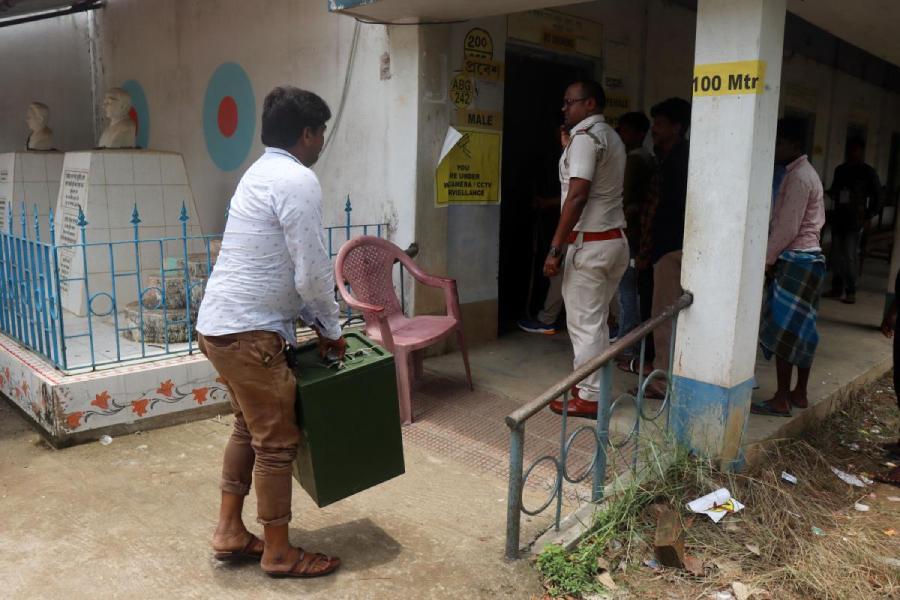Inside Hatishala Sarojini High Madrasha in Bhangar, some 29km east of Calcutta, a crowd of around 70 men remained huddled on the ground floor outside four polling booths on Saturday afternoon.
At the entrance to the booths, police in white remained seated on chairs unfazed by the stream of men walking in and out of the sprawling premises. Inside, polling personnel discussed how over 60 per cent of polling was over by 2 pm, almost three hours before the deadline.
"I didn't see any central force jawan inside," 58-year-old Rafiqul Mollah told this correspondent while coming out of the polling station.
The same complaint was heard not only in Hatishala but also in Hathgacha, Kulberia and Kathalberia that comprise Bhangar, which was undoubtedly one of the epicentres of political violence in the run up to the rural polls.
"The forces are on the way to Bhangar," said a police officer outside Kathaberia primary school, where polls were over by 1.30 pm. All 975 votes have been cast, he said.
Much like Bhangar, central forces were missing from most polling premises across a large part of Bengal with both the ruling Trinamul and the Opposition, including the BJP and the Congress-Left combine, questioning the arrival and deployment of central forces at booths.
Till Friday night, senior officials of the State Election Commission said 590 companies had reached Bengal. The figure crossed the 600-mark by Saturday morning with several parts of the state remaining bereft of any deployment of central forces for the better part of the day.
"We received a team of 73 personnel from the Punjab Police at 4pm. They were deployed for two hours — an hour before the end of the elections and an hour after it," said a senior police officer overseeing the deployment of central forces in Bhangar.
"The deputy superintendent of police leading the team told us that he had received an intimation four hours before boarding the train for Calcutta at 11am on Friday. Other team members said they were clueless about the duration of their day and their specific role in West Bengal polls."
With a target of 822 companies of central forces for the rural polls, S.C. Budakoti, the inspector general of BSF in charge of overseeing the deployment of the forces, had decided early on Friday to deploy at least four personnel from central forces at a polling station if it had one or at most two booths.
On Saturday, even that was missing. Several Opposition leaders said that no-show of the central forces was primarily responsible for the violence across Bengal, which took at least 17 lives.
Senior police officers admitted there was confusion about the choice of selecting polling premises and booths for the deployment of central forces.
"On July 4, Calcutta High Court said about deploying central forces in every booth. That did not happen as the force refused to deploy less than 4 persons (half a company) at one place," said a senior police officer of the state police. The result was inevitable.
In South Dinajpur's Gangarampur and Garafusura in Purulia, ballot boxes from a booth were looted and dumped in a pond nearby. In Birbhum's Suri, ballot papers were pulled out of ballot boxes in one of the booths and set on fire. In North 24 Parganas's Baduria and Murshidabad's Domkol, outsiders barged into polling stations and allegedly cast vote randomly overpowering police.
"There is a misconception that deployment of central forces will work wonders. Law and order situations don't follow any linear progression," said a senior IPS office of the state police.
"The forces started arriving on June 23 when the first lot slotted for Bankura. Rural polls have traditionally been violence-prone and a mere area domination exercise isn't enough."
State election commissioner Rajiva Sinha questioned the Centre's delay in despatching central forces while accounting for the large-scale violence.
"Why did the central forces reach so late? We had sought for the forces from the Centre on June 22 and had to send repeated reminders thereafter," Sinha said. "Despite the reminders, about 485 companies reached by July 3."
Sources in the Ministry of Home Affairs said the State Election Commission had requisitioned for the forces quite late and did not provide the mandatory details about which railway station the forces should deboard and where they should head for after getting off.
The coordinators of each of the companies were asked to get in touch with the district magistrates adding to further delay in movement.
"The deployment of the force is a matter of the state poll panel and the state police... Leave alone proper co-ordination, They did not even make proper logistical arrangements for the jawans," said a source in the BSF.










